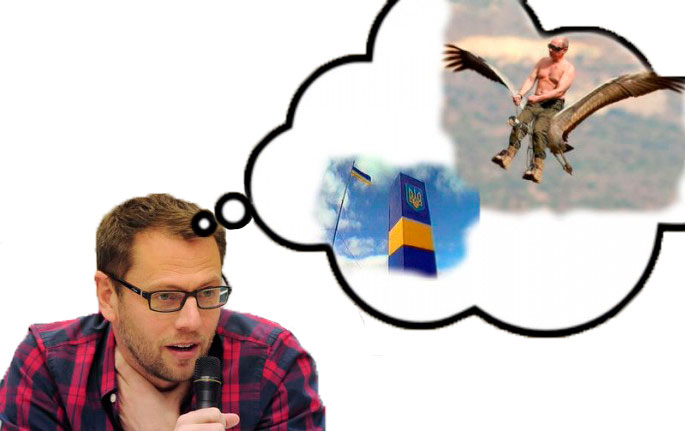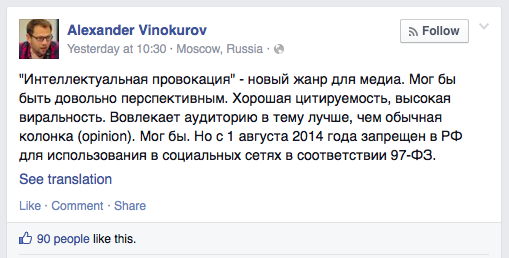
TV Rain owner Aleksandr Vinokurov posted on Twitter that Vladimir Putin was on his way to Ukraine to negotiate with President Poroshenko. That wasn't the real story. Images mixed by author.
The owner of a prominent TV news channel caused an uproar this week when he tweeted a fake news story about Vladimir Putin rushing to Kyiv for emergency peace talks. Aleksandr Vinokurov, owner of TV Rain, exploited the public's heightened interest in Ukraine to shock Russians into considering the potential harm of new regulations on the blogosphere, which take effect next month.
In the midst of the Malaysia Airlines MH17 plane crash investigation and the continuing tensions in Eastern Ukraine, RuNet users are hanging onto every new bit of news and gossip about the actions of Ukraine, Russia, and the West. Any innocent tweet or post can set the news agenda aflame, especially if it mentions Vladimir Putin.
On the morning of July 20, three days after the MH17 crash, Vinokurov tweeted the following news:
Президент Путин позвонил Порошенко и вылетел в Киев, чтобы обсудить с украинским коллегой варианты мирного разрешения конфликта на Донбассе
— Винокуров Александр (@Vinokurov12) July 20, 2014
President Putin called Poroshenko and flew to Kyiv to discuss the options for a peaceful resolution of the conflict in Donbass with his Ukrainian colleague.
He made no other comment, did not provide links or sources, and did not post follow-ups. There was no confirmation of the visit on either of the official Presidential websites. Internet users were at first surprised, then skeptical, then disbelieving.
Twitter user MaryEl immediately questioned the story:
@Vinokurov12 Правда?
— MaryEl (@maryel2002) July 20, 2014
Really?
Owner of the parody account Navalny's Cat joked that the tweet was actually authored by Aram Gabrelyanov, CEO of the intensely pro-Kremlin publishing house NewsMedia:
@Vinokurov12 Арам Ашотович, перелогиньтесь!
— Кот Навального (@navalny_cat) July 20, 2014
Aram Ashotovich, please login under your own name!
Some users, like Russian fun, were inclined to believe in Vinokurov‘s credible reputation, but wanted to see other sources:
@yesfree33 Винокуров вроде нормальный журналист. Ну посмотрим, что скажу остальные СМИ.
— Russian fun (@Russianhumor) July 20, 2014
Vinokurov seems to be a decent journalist. Well, let's see what the other media will say.
Vinokurov stayed conspicuously silent on social media for the next four hours, while speculation raged among Russian and Ukrainian netizens. Finally, around 10:30 in the morning, Moscow time, he appeared on Facebook. Vinokurov did not directly debunk the information, but instead presented it as a case study in what he called “intellectual provocation.” He explained that his earlier experiment in posting a fake news story was to show how it could go viral — and how such things would no longer be allowed in Russia, after a new “Law on Bloggers” takes effect in August.
“Интеллектуальная провокация” — новый жанр для медиа. Мог бы быть довольно перспективным. Хорошая цитируемость, высокая виральность. Вовлекает аудиторию в тему лучше, чем обычная колонка (opinion). Мог бы. Но с 1 августа 2014 года запрещен в РФ для использования в социальных сетях в соответствии 97-ФЗ.
“Intellectual provocation” — a new genre for the media. Could be a very promising one. Great citation rate, highly viral. Engages the audience in the topic a lot better then a regular opinion column. Could be. But starting on August 1, 2014, it's banned in the Russian Federation for use in social networks in accordance with [Federal Law] 97.
Although Vinokurov claimed his actions were essentially demonstrating the constraints of new Internet laws in Russia, the audience did not take kindly to his “intellectual provocation.”
Facebook user Dmitri Kojevnikov did not enjoy the euphemism:
“Интеллектуальная провокация” — пиздеж на либспике?
“Intellectual provocation” — is that “bullshitting” in liberal speak?
User Tatiana Kulichik accussed Vinokurov of being a simple internet troll:
Чем отличается от троллинга?
How is this different from trolling?
Another Facebook user, Vladimir Lazutkin sarcastically pointed out that he fails to see the harm in banning lies online:
Врать запретили! Какая досада!))
Lying is forbidden! What a pity! :)
In his didactic post about the whole affair, Vinokurov refers to one of the several new laws aimed at regulating (and censoring) the Russian Internet. 97-FZ, also known as the “Law on Bloggers,” was adopted in May and comes into force on August 1, 2014. Besides requiring popular bloggers to assume what is basically the status of a mass media outlet, the law demands that these people “verify the credibility of the published information available to the public before it is published and immediately delete published information that has been proven false.” (You can read the full text of the law in Russian here.)
Was Vinokurov's stunt cruel in such a fraught situation, given the already jittery state of media, bloggers, and Internet users? Probably. Was it successful at making a point about the harshness of the new Russian Internet regulations? Maybe. Will it help change the situation and promote the freedom of speech and responsible sharing of information? Probably not.









2 comments
The internet has now become part of the battle ground.
The crash of the 777 points this out in great detail.
Much of the evidence and counter evidence has come directly from the Internet.
So sadly it is logical to expect nations and their military experts to want to pass laws to control this battle fields. Every year as the power of social media grows so do the calls for increase control of it. You have NSA spying on it. You have EU demanding google protect privacy and delete social media. You have Nations passing laws to control the content. It is logical to expect those in power to want to control such a powerful force. It is also logical for those who want to protect the freedoms of the Internet to fight against such controls.
Putin although successful in terrorising fed Russia away from a break up and democratic future as promised from his accentuation in the KGB that created admirable to the closet communists long held duma positions that oscillate the now “soviet hybrid state”, his many attempts at political, economic and public reform have been diabolic and if ever a leader was incompetent, retro-progressive or simply useless, Putin is that leader.
Duma ideology may preach eternally that silencing the masses and brainwashing them with state propaganda will keep failing cohorts in power but the reality is that far less than Russians excepting a more poorer Stalingrad type nationalistic ethos, Russia will slow burn economically and oppressively into a situation where by much worse than the level of kickback in Kiev, a new great Berlin wall will manifest thought out the Russian citizens dysfunction and create a huge collapse in the confidence of the whole public mass.For Putin it is inescapable that their will be “tears before bedtime.”